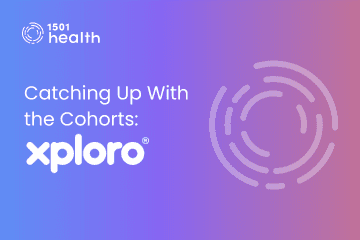Accelerator
Jul 12, 2023
Xploro Brings the “X” Factor to Gamification in Healthcare

When Dom Raban’s 13-year-old daughter was diagnosed with Ewing’s Sarcoma in 2011, she had great clinical care but was given virtually no information about what it all was for.
The people, the environment, the treatment, the technologies—nothing was explained. When her primary doctor referred her to another site for more specialized care, it was a cancer ward. No one had even mentioned “the C word” to her. She felt excluded from her own health.
When she came out of treatment, Dom did what so many parents do: reflected on the experience and thought about how he could improve it for other children in the future.
Enter Xploro, an award-winning health information platform that uses augmented reality, gameplay and artificial intelligence to deliver health information to young patients.
Keep reading to learn more about how Dom launched Xploro, how the team develops new features and what he learned in 1501 Health.
Q: Why do you believe augmented reality gameplay can be such a powerful advantage in healthcare or consumer tech? What made you choose those elements?
A: At the beginning, we weren't using technology to find a solution. We had a solution and were looking for the right technology.
I'm a software designer, so I thought about how digital intervention could engage children in their healthcare journey.
In the U.K., we have a Year 10 work experience, which is where 14- and 15-year-olds can get basic work experience at local companies.
On our team, we asked our student group to imagine themselves in a hospital and give us ideas on what would make the experience better. It became obvious that to engage kids, we needed to build something gamified and include augmented reality for that extra dimension of engagement.
Q: This certainly wasn’t the last time you engaged actual users in the process. You currently have an Expert Advisory Board made up of kids ages 8-15. Can you tell us about how that was formed and why it’s important to the success of Xploro programming?
A: Everything I’ve done for the last 20-odd years has been around human-centered, user-centered design.
After that initial build, we were doing some ad-hoc user testing with patients in hospitals, but we quickly realized we needed a group of kids to help steer the direction of Xploro and give us advice more regularly.
We’ve co-created a lot with this group, like adding a mood emoji in our calendar function.
We are fortunate that the kids represent a broad cross section of experiences, ages, neurodiversity and demographics.
One kid in particular who has an autism diagnosis, poses the most brilliant questions, like “What's it gonna smell like? What colors are gonna be in the room?” It’s things we never would have thought about.
Q: Some hospitals employ child life specialists whose role is to help children navigate complex medical journeys using play. Do you see your platform as a supplement or even expansion on this service?
A: Supplement is exactly the right word. Child life professionals get what it is we are trying to do with Xploro. The trouble is many hospitals don't have enough child life specialists to go around, if they have any at all.
Xploro is certainly never going to replace the valuable role of child life specialists, but we’re trying to be there inside and outside of the hospital.
Q: You recently completed your first investment round led by U.S. investors in February, and you moved headquarters to Cleveland, Ohio. What factors led to this decision?
A: We were introduced to University Hospitals in Cleveland and their venture arm through another accelerator program, Kids X. The network wanted to invest in us and it was part of the criteria of the investment that we be located in Ohio.
But, honestly, without that stipulation, if you look at the
The gentleman that heads up our operations in the U.S. was Chief Innovation officer at Akron Children's Hospital for five years prior to joining Xploro. He’s been a real game-changer for us.
In addition to the U.K. and the U.S. we are also in use in Ghana, Malawi and Cameroon through a charity called World Child Cancer.
This enables us to get Xploro in the hands of children in low- and middle-income countries where they wouldn't otherwise have access to the technology. It's such a rewarding part of our work.
Q: What was the best guidance your 1501 Health mentors gave you to navigate your business growth?
A: 1501 Health is unlike other accelerators or incubators because of the panel ofexperts from both the payer and the provider side.
Up until we joined, our market was primarily providers and hospitals. I wanted to know how we could access the primary care market and the payer market. Mallory Kusterer, the Healthworx Director of Specialty Product Innovation was my mentor on the payer side, was just absolutely brilliant and we would not have secured our largest contract to date without her and 1501 Health’s support.
Q: What is the one piece of advice you would give entrepreneurs who are developing healthcare technology specifically for children?
A: Don’t develop the healthcare technology for children, develop healthcare technology with children.
Community Story:
A: One of the most powerful endorsements I receive for Xploro and for the power of games themselves come from the kids and the stories their parents share.
A mum of a 12-year-old boy going through treatment for osteosarcoma said he was playing a game within Xploro called Plasma Patrol.
It's a game where your avatar jumps in a spaceship, takes off, lands up in the bloodstream, and then has to destroy cancer cells and avoid white blood cells and fat cells and dead cells and all the rest of it. They can get power-ups by grabbing bags of chemotherapy and vitamins and iron.
The next day, he went in for his fourth round of chemotherapy and told the nurse he finally got why he was having chemotherapy. All because he got a 300-point power-up in a game the night before.
It changed his attitude toward his treatment, and she said there was a lightness about him that she hadn't seen before during treatment.
That is the power of games.
Media Moves:
Xploro app startup moves to Cleveland, raises first U.S.-led investment
Cleveland Inno | February 2023
Xploro closes first US funding round
Prolific North | January 2023
Awards:
Best Startup, SPX (Shared Patient Experience) Awards | June 2023
Best Startup, Medilink Healthcare Business Awards | March 2023
Finalist, AbilityNet Tech4Good Awards | September 2020
People’s Choice Award, Impact Awards| June 2020
About 1501 Health
1501 Health is a unique partnership between Healthworx and LifeBridge Health, representing expertise in both health insurance and financing (payers) and healthcare delivery and services (providers). The investment and incubation program empowers entrepreneurs to get their innovative solutions to market and expand their impact in healthcare quality, access and affordability. To learn more about 1501Health, visit www.1501Health.com.
About Healthworx
Healthworx operates at the intersection of healthcare and innovation by creating, co-creating and investing in companies that are improving healthcare quality, accessibility, affordability and equity. As the innovation and investment arm of CareFirst BlueCross BlueShield, Healthworx envisions a healthier future for all people by changing the way health works. To learn more about Healthworx, visit https://www.healthworx.com.
About LifeBridge Health
LifeBridge Health is one of the largest, most comprehensive providers of health services in Maryland. LifeBridge Health includes Sinai Hospital of Baltimore, Northwest Hospital, Carroll Hospital, Levindale Hebrew Geriatric Center and Hospital, Grace Medical Center and related affiliates. For more information, visit www.lifebridgehealth.org.
